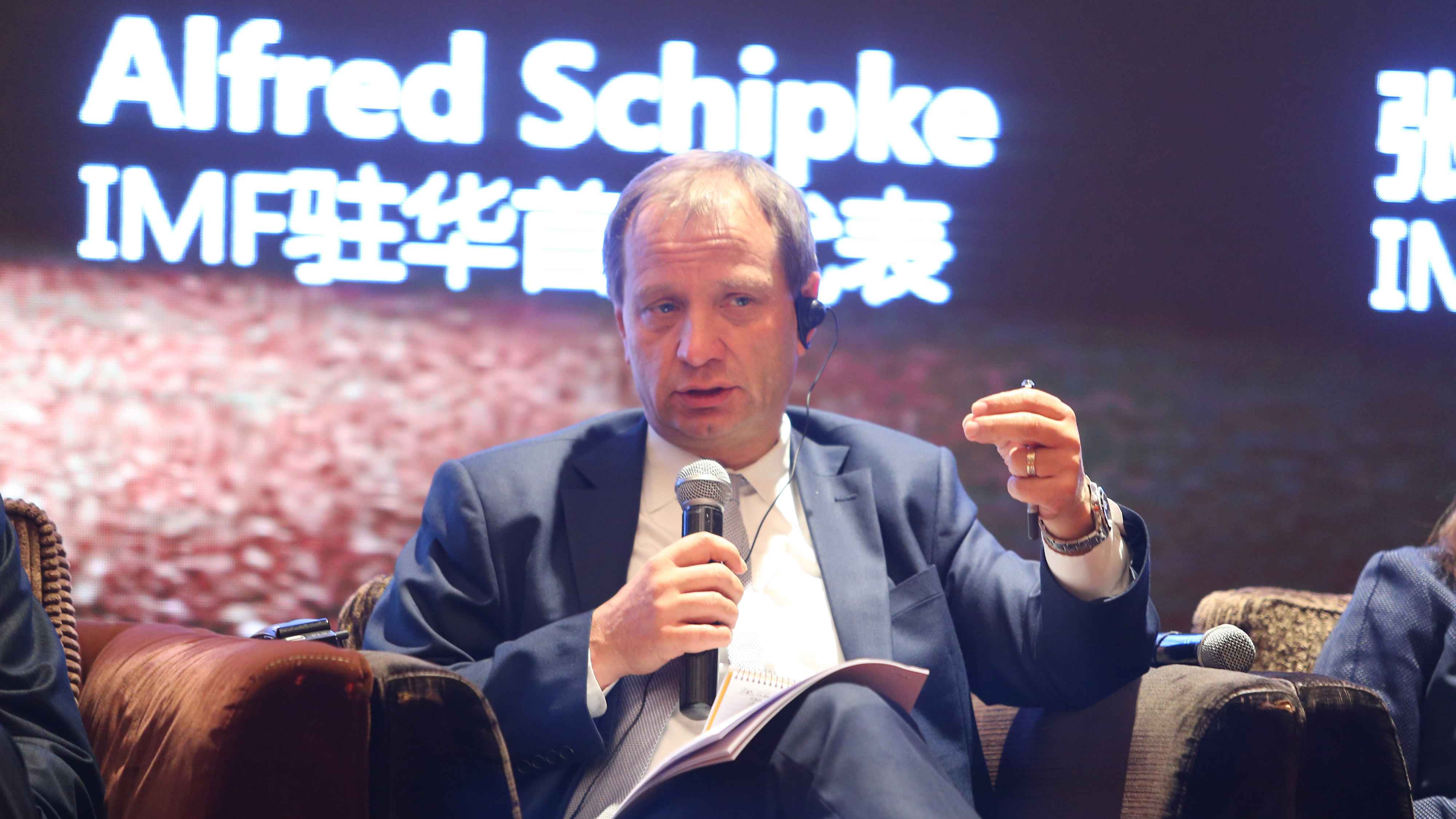
China
09:10, 01-Nov-2017
IMF: Preventing a Minsky Moment in China
By Song Yuanyuan

As China moves from an external-led economy toward a more service-dominated one in its restructuring and rebalancing, the core challenge remains an excessive reliance on debt, an International Monetary Fund (IMF) official said at the launch of IMF's World Economy Outlook (WEO) report on Tuesday in Beijing.
Warnings of a potential Minsky Moment, or a sudden major collapse of asset values sparked by debt or currency pressures, were issued earlier by governor Zhou Xiaochuan of the People’s Bank of China during the 19th CPC National Congress. Zhou added that corporate debt levels are relatively high and household debt is rising too quickly. This high-debt problem was again seriously addressed by IMF officials.
How do we prevent such a moment? Deleveraging, or the reduction of debt by rapidly selling assets, was identified as a priority at the 19th CPC National Congress. Addressing this, Dr. Alfred Schipke, chief representative of the IMF in Beijing said in an interview with CGTN that "the most concerning one is corporate debt, who causes the high debt and where it comes from, and its linkage to the financial sector."

Shipke speaking at the launch of World Economic Outlook on Oct 31, Beijing /Photo from IMI of RUC
Shipke speaking at the launch of World Economic Outlook on Oct 31, Beijing /Photo from IMI of RUC
Shipke pointed out, “First, a large chunk of the debt comes from state enterprises and zombie firms, so it requires reforms, second, after the first problem was resolved, making sure credits go to the most productive part of the economy and so companies compete with each other on equal footing.”
Shipke's analysis points to China's high savings rate as the root cause. He stated that this requires rebalancing to help increase consumption, so there will be less reliance on debt for corporations.
Shipke suggested that China learn from better practices internationally, including the income tax. “China’s tax system is regressive, it has a value-added tax system, but everyone pays for value-added tax – whether they're rich or poor. Which means the poor actually pays a larger share of their income on goods than the wealthy.”
An income tax could help China's tax system, by having those who earn more pay a higher percentage in taxes, allowing the government to use the additional tax resources to help the poor, education and health care, which again helps the rebalancing and restructuring effort, said Shipke.
He added that property tax could be a way for local governments to increase their own sources of spending and stay on sound footing.
Prof. Xiang Songzuo, an outspoken economist and Deputy Director of the International Monetary Institute (IMI) of Renmin University reiterated that although deleveraging might conflict with growth rates, it's needed for sustainable economic growth. "Governor Zhou brought up 'Minsky Moment' as an early warning, but so far the risks can be and should be contained," said Prof. Xiang, adding that China's monetary policy will be tightened.

Prof. Xiang speaks at the panel discussion for the launch of the World Economic Outlook on Oct 31, Beijing. /Photo from IMI of RUC
Prof. Xiang speaks at the panel discussion for the launch of the World Economic Outlook on Oct 31, Beijing. /Photo from IMI of RUC
Shipke also noted the importance of the RMB’s entry into the Special Drawing Rights (SDR) or an international reserve asset, last October. “It is important for the IMF, for China and for the world,” said Shipke.
Whether the RMB will be used more internationally will depend on two key factors. One is China’s economic reforms which decides whether it can develop in a sustainable manner, the other is market-based monetary policy, a strong and credible framework will boost confidence of using RMB as means of payment, store of value and other financial functions.
The IMF’s October WEO report launch in Beijing was co-hosted by the International Monetary Institute of Renmin University. The new report revised the April WEO, upgrading the growth rate of world economy to 3.7 percent for 2017 and 3.8 percent for 2018, both up 0.1 percent from the April forecast. It upgraded China’s economic growth to 6.8 percent for 2017 and 6.5 percent for 2018, up 0.2 percent and 0.3 percent percent from the April forecast.

Wu Xiaoqiu (middle), vice president of Renmin University and Dr. Shipke on his left, together with other economists and scholars at the launch of the IMF WEO report on Oct 31, Beijing /Photo from IMI of RUC
Wu Xiaoqiu (middle), vice president of Renmin University and Dr. Shipke on his left, together with other economists and scholars at the launch of the IMF WEO report on Oct 31, Beijing /Photo from IMI of RUC
Although the global cyclical upswing that began midway through 2016 continues to gather strength as the report suggests, Schipke also pointed out that the global economic recovery is incomplete, warning the middle-term downside risks, such as geographical and political uncertainties and potential financial risks, low wage growth and low inflation in advanced economies.
(Han Jie also contributed to this story)

SITEMAP
Copyright © 2018 CGTN. Beijing ICP prepared NO.16065310-3
Copyright © 2018 CGTN. Beijing ICP prepared NO.16065310-3